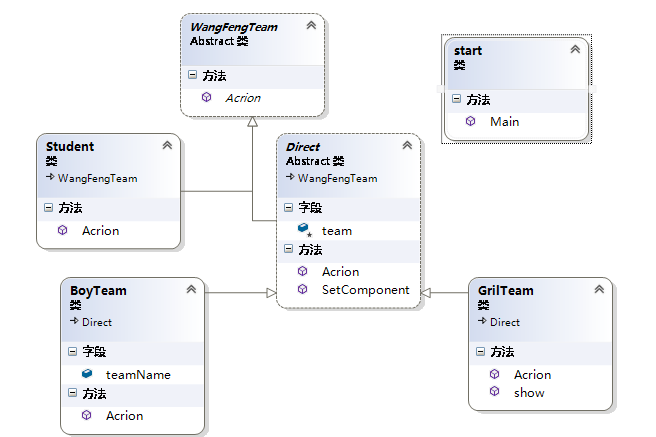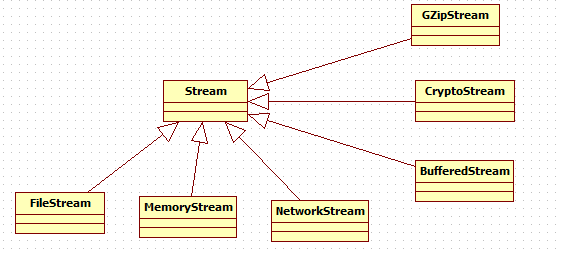 Backend Development
Backend Development
 C#.Net Tutorial
C#.Net Tutorial
 Analyzing the Decorator Pattern in C# Design Pattern Programming
Analyzing the Decorator Pattern in C# Design Pattern Programming
Analyzing the Decorator Pattern in C# Design Pattern Programming
Decorator pattern definition: Instead of adding or modifying class attribute actions through derived classes, this effect is achieved dynamically through pattern design. It is more convenient and flexible than inheritance and reduces the complexity of the program.
Example
Wang Feng builds a championship team.
First of all, the team category was empty. After Wang Feng’s continuous efforts, he won students for the team and created a suitable platform for team members to perform.
The team continues to become stronger and more complete because the decorators add and modify the base class according to different needs, and finally win your approval and meet your needs.
Class diagram to implement the assembler pattern:

Team formation code
//汪峰战队
abstract class WangFengTeam
{
//执行策划命令
abstract public void Acrion();
}
//学员
class Student : WangFengTeam
{
// Methods
override public void Acrion()
{
Console.WriteLine("汪峰团队学员情况:");
}
}
// 战队总策划
abstract class Direct : WangFengTeam
{
//汪峰战队
protected WangFengTeam team;
// 策划活动
public void SetComponent(WangFengTeam team)
{
this.team = team;
}
//执行策划
override public void Acrion()
{
if (team != null)
{
team.Acrion();
}
}
}
//男孩唱狂放型的,构建一个组合。
class BoyTeam : Direct
{
// 组合名称
public string teamName= "锋利的Jquery";
//具体策划
override public void Acrion()
{
base.Acrion();
Console.WriteLine("我是汪峰团队,狂放型的。");
}
}
//女孩唱婉约型的,来个模特表演
class GrilTeam : Direct
{
//具体策划
override public void Acrion()
{
base.Acrion();
Console.WriteLine("我是汪峰团队,婉约型的。");
//模特表演
show();
}
public void show()
{
Console.WriteLine("婉约型,走秀");
}
}Client code:
public static void Main()
{
Student team = new Student();
BoyTeam boy = new BoyTeam();
GrilTeam girl = new GrilTeam();
//团队男孩装饰
boy.SetComponent(team);
//团队女孩装饰
girl.SetComponent(boy);
girl.Acrion();
Console.Read();
} Advantages and disadvantages of the decorator pattern
After reading the detailed introduction of the decorator pattern, let's continue to analyze its advantages and disadvantages.
Advantages:
The purpose of the decoration pattern and inheritance is to extend the functionality of the object, but the decorator pattern is more flexible than inheritance
By using different concrete Decoration classes and the permutations and combinations of these classes, designers can create many combinations of different behaviors
The decorator pattern has good scalability
Disadvantages:
Decoration The operator pattern will lead to many small objects in the design, and if overused, the program will become more complex. And more objects make it harder to make mistakes, especially if they all look alike.
Usage Scenarios
Let’s take a look at the specific situations in which the decorator pattern is used. The decorator pattern should be used in the following situations:
Need to extend the functionality of a class or add to a class Additional Responsibilities.
Need to dynamically add functions to an object, and these functions can be dynamically revoked.
Need to add a very large number of functions generated by the permutation and combination of some basic functions
Implementation of the decorator pattern in .NET
There is also a decorator pattern in the .NET class library Implementation, this class is System.IO.Stream. Let’s take a look at the Stream class structure:

BufferedStream, CryptoStream and GZipStream are actually two specific decoration classes. The decorator here The pattern omits the abstract decorator role (Decorator). The following demonstrates how the client can dynamically add functions to MemoryStream.
MemoryStream memoryStream = new MemoryStream(new byte[] {95,96,97,98,99});
// 扩展缓冲的功能
BufferedStream buffStream = new BufferedStream(memoryStream);
// 添加加密的功能
CryptoStream cryptoStream = new CryptoStream(memoryStream,new AesManaged().CreateEncryptor(),CryptoStreamMode.Write);
// 添加压缩功能
GZipStream gzipStream = new GZipStream(memoryStream, CompressionMode.Compress, true);Summary
This is the end of the introduction to the decorator pattern. The decorator pattern uses object combination rather than inheritance to dynamically expand object functions at runtime. ability, and can expand multiple functions as needed, avoiding the "poor flexibility" and "multi-subclass derivation problems" caused by using inheritance alone. At the same time, it is well in line with the object-oriented design principles of "preferring object composition over inheritance" and the "open-closed" principle.
For more articles related to analyzing the decorator pattern in C# design pattern programming, please pay attention to the PHP Chinese website!

Hot AI Tools

Undresser.AI Undress
AI-powered app for creating realistic nude photos

AI Clothes Remover
Online AI tool for removing clothes from photos.

Undress AI Tool
Undress images for free

Clothoff.io
AI clothes remover

AI Hentai Generator
Generate AI Hentai for free.

Hot Article

Hot Tools

Notepad++7.3.1
Easy-to-use and free code editor

SublimeText3 Chinese version
Chinese version, very easy to use

Zend Studio 13.0.1
Powerful PHP integrated development environment

Dreamweaver CS6
Visual web development tools

SublimeText3 Mac version
God-level code editing software (SublimeText3)

Hot Topics
 .NET Deep Dive: Mastering Asynchronous Programming, LINQ, and EF Core
Mar 31, 2025 pm 04:07 PM
.NET Deep Dive: Mastering Asynchronous Programming, LINQ, and EF Core
Mar 31, 2025 pm 04:07 PM
The core concepts of .NET asynchronous programming, LINQ and EFCore are: 1. Asynchronous programming improves application responsiveness through async and await; 2. LINQ simplifies data query through unified syntax; 3. EFCore simplifies database operations through ORM.
 Advanced C# .NET: Concurrency, Parallelism, and Multithreading Explained
Apr 03, 2025 am 12:01 AM
Advanced C# .NET: Concurrency, Parallelism, and Multithreading Explained
Apr 03, 2025 am 12:01 AM
C#.NET provides powerful tools for concurrent, parallel and multithreaded programming. 1) Use the Thread class to create and manage threads, 2) The Task class provides more advanced abstraction, using thread pools to improve resource utilization, 3) implement parallel computing through Parallel.ForEach, 4) async/await and Task.WhenAll are used to obtain and process data in parallel, 5) avoid deadlocks, race conditions and thread leakage, 6) use thread pools and asynchronous programming to optimize performance.
 How to convert char in C language
Apr 03, 2025 pm 03:21 PM
How to convert char in C language
Apr 03, 2025 pm 03:21 PM
In C language, char type conversion can be directly converted to another type by: casting: using casting characters. Automatic type conversion: When one type of data can accommodate another type of value, the compiler automatically converts it.
 What is the role of char in C strings
Apr 03, 2025 pm 03:15 PM
What is the role of char in C strings
Apr 03, 2025 pm 03:15 PM
In C, the char type is used in strings: 1. Store a single character; 2. Use an array to represent a string and end with a null terminator; 3. Operate through a string operation function; 4. Read or output a string from the keyboard.
 How to use char array in C language
Apr 03, 2025 pm 03:24 PM
How to use char array in C language
Apr 03, 2025 pm 03:24 PM
The char array stores character sequences in C language and is declared as char array_name[size]. The access element is passed through the subscript operator, and the element ends with the null terminator '\0', which represents the end point of the string. The C language provides a variety of string manipulation functions, such as strlen(), strcpy(), strcat() and strcmp().
 What is the function of C language sum?
Apr 03, 2025 pm 02:21 PM
What is the function of C language sum?
Apr 03, 2025 pm 02:21 PM
There is no built-in sum function in C language, so it needs to be written by yourself. Sum can be achieved by traversing the array and accumulating elements: Loop version: Sum is calculated using for loop and array length. Pointer version: Use pointers to point to array elements, and efficient summing is achieved through self-increment pointers. Dynamically allocate array version: Dynamically allocate arrays and manage memory yourself, ensuring that allocated memory is freed to prevent memory leaks.
 How to handle special characters in C language
Apr 03, 2025 pm 03:18 PM
How to handle special characters in C language
Apr 03, 2025 pm 03:18 PM
In C language, special characters are processed through escape sequences, such as: \n represents line breaks. \t means tab character. Use escape sequences or character constants to represent special characters, such as char c = '\n'. Note that the backslash needs to be escaped twice. Different platforms and compilers may have different escape sequences, please consult the documentation.
 C# .NET Performance Optimization: Real-World Techniques for Faster Applications
Apr 02, 2025 pm 02:06 PM
C# .NET Performance Optimization: Real-World Techniques for Faster Applications
Apr 02, 2025 pm 02:06 PM
Methods to improve the performance of C#.NET applications include: 1. Optimize garbage collection (GC) by reducing object allocation and using array substitution lists; 2. Reasonable use of asynchronous programming to avoid blocking the main thread; 3. Optimize LINQ queries by avoiding method chains and using delayed execution; 4. Use parallel processing such as Parallel.For to improve the performance of complex scenarios; 5. Avoid common errors such as memory leaks and deadlocks, and use debugging tools to fix them.





